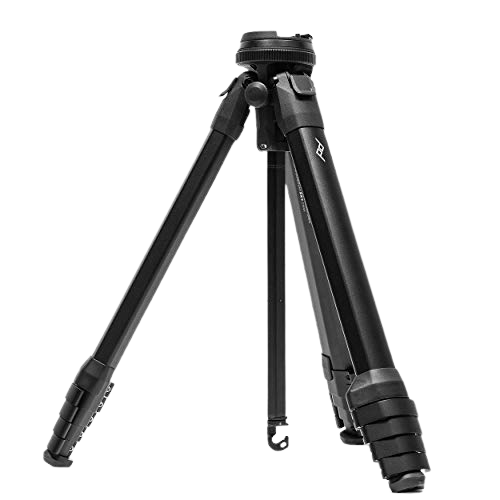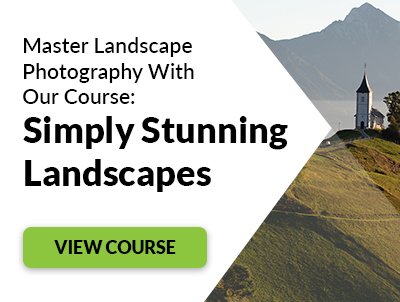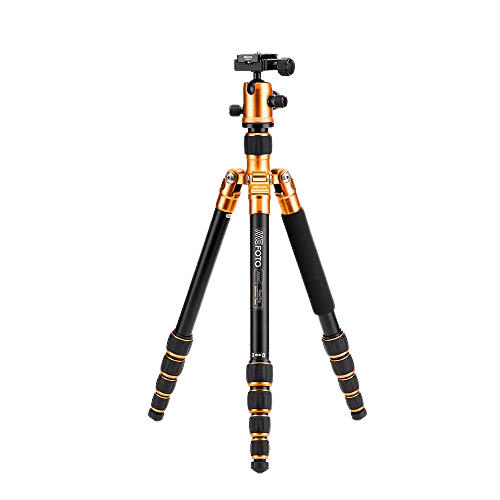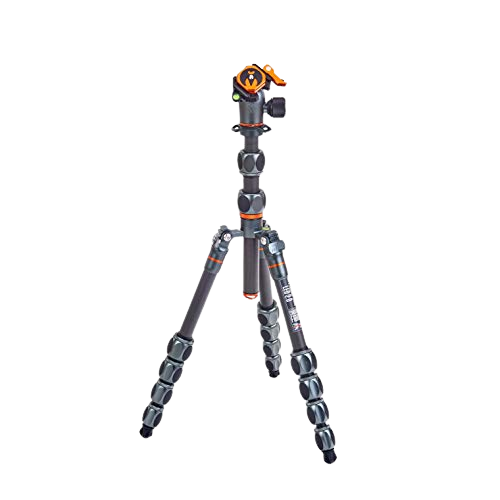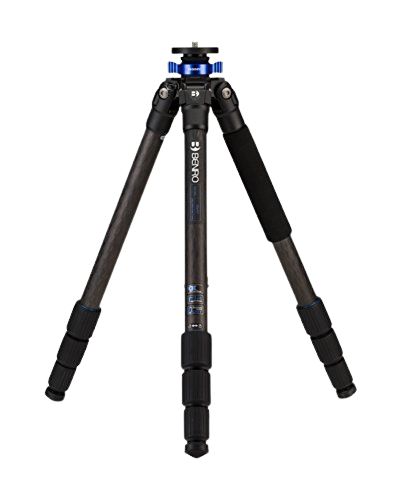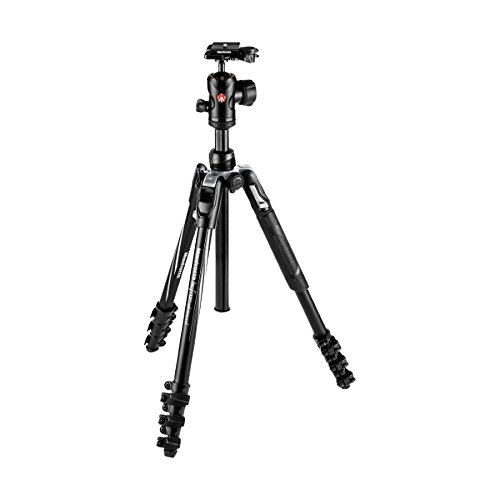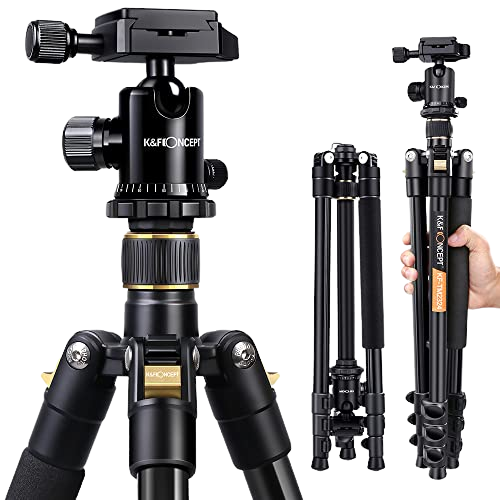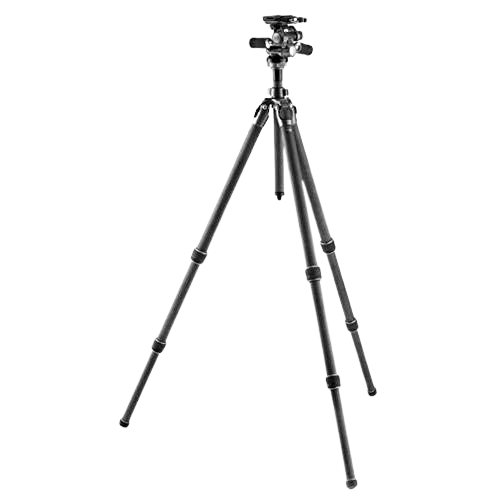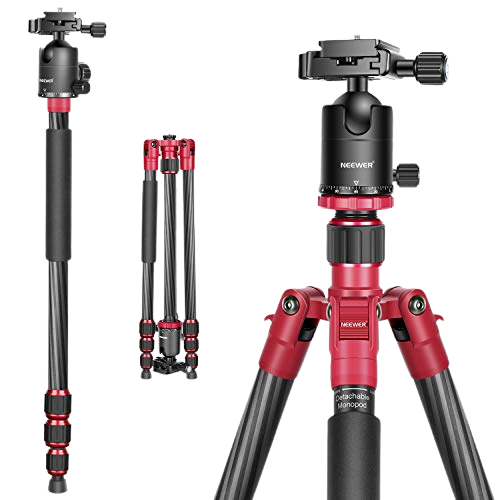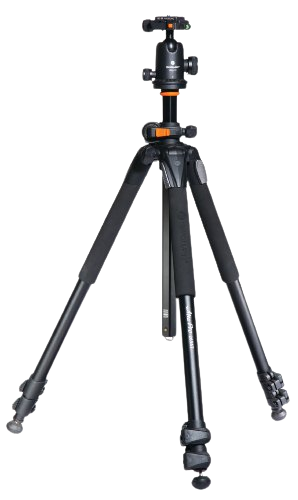We’ve selected some of the best tripods available at a range of prices. That range is from very affordable to extremely expensive. Our top pick is the Peak Design Aluminum Travel Tripod. It is super-compact but has an impressive load capacity and a tall maximum height. [Note: ExpertPhotography is supported by readers. Product links on ExpertPhotography are referral links. If you use one of these and buy something, we make a little bit of money. Need more info? See how it all works here].
What is the Best Tripod?
There is always a payoff when choosing a tripod. The most stable ones, used by TV news crews, are absurdly heavy and bulky. The smallest, lightest ones will struggle to keep your camera steady. We’ve chosen a range of tripods that strike a balance between those two aspects. Before we look at each of them in detail, here is a summary of our recommendations.
What’s the Best Tripod for You?
Let’s look in more detail at what we’ve chosen. You’ll be able to decide which one has the perfect blend of features for your needs. The tripod legs have four telescoping sections with lever locks. The legs have two lockable leg angles, letting you work as low as 14 cm (5.5 inches) off the ground. It’s fast to set up and take down. The tripod comes with Peak Design’s unique ergonomic ball head with an Arca-Swiss compatible quick-release plate. A small bubble level built into the head helps you level the tripod. The ball head swivels freely and is quick and easy to use. But there is no way to lock it to sweep only horizontally. This makes it hard to take panoramas. You can switch out the ball head with a universal head adapter. I often change to a gimbal when shooting wildlife. It is not just that this Peak Design Tripod folds up to one of the smallest on the list, but the diameter is also compact. The entire thing is about the same size as a water bottle. Everything is streamlined with no protruding knobs. The tripod comes in a waterproof soft case of the same quality as Peak Design’s coveted bags. The MeFoto RoadTrip Classic Lightweight tripod is one of the brand’s most popular. You can get this tripod in carbon fiber or upgrade to the Pro version. The tripod is compact and lightweight enough for traveling or hiking. The tripod sets up quickly and folds away into a carrying case. The tripod has five leg sections with an anti-rotation twist lock system. This lets you set up the tripod fast in all weather conditions. The legs can be angled independently for flexibility and locked into place at two different angles. You can detach one leg and remount the center column to turn it into a monopod. The MeFoto comes with a triple-action Q series ball head and has an Arca-Swiss compatible plate. The head has 360-degree panning and separate knobs controlling tension. The MeFoto tripods are an antidote to the boring black and metal tripods. They come in a host of fun metallic colors. Some professional photographers use a MeFoto because it does not look like a typical tripod. And you can always find it in a crowd! It looks like a fashion accessory but functions like a pro. The hardest part about ordering this tripod may be choosing a color. The tripod legs flip up for storage. And it comes with a nice carrying case. If you are buying your first tripod, the MeFoto Roadtrip Classic is a great place to start. If you want a slightly heavier tripod, go with a MeFoto GlobeTrotter. The carbon fiber Really Right Stuff (RRS) Ascend-14 Long is an all-in-one travel tripod. The long version provides extra working height yet still compacts into a backpack. The legs have four sections with a twisting lock mechanism. You can independently position the legs for the most flexibility with four angle-stop positions. The head is an integrated Acra-Swiss ball head. It is recessed into the legs and tucks away for the smallest profile. The head can be removed and replaced with a universal adapter. This lets you mount a different head on the tripod. You can remove part of the center column to place the tripod lower to the ground. The minimum working height is only 13 cm (5.1 inches). The tripod is black with silver accents. Really Right Stuff makes a series of tripods. If you are looking for a professional-level landscape tripod, RRS also has you covered with the Versa M2 (TVC-34L). For many professional photographers, RRS is the gold standard when it comes to tripods and camera accessories. But quality comes at a price. The Ascend-14 is the most expensive offering on this list. But the only thing not to like about this tripod is the price. The 3 Legged Thing Leo 2.0 is a mid-priced ultra-compact professional-level travel tripod. If you are looking for a tripod, you cannot go wrong with one from 3 Legged Thing. You can find a 3 Legged Thing tripod in all price ranges. It is incredibly modular and flexible. This carbon fiber tripod is one of the lightest on this list but has the most load capacity at 30kg (66 pounds). There is nothing you cannot mount on this tripod! The center column is telescopic, like the legs. You can expand it vertically when you need extra height and compact it down again when you don’t. You can detach all three legs making this into a handy tabletop tripod. The legs can also be used as a monopod or a boom arm. It includes six 1/4″ and one 3/8″ threaded holes for mounting many accessories. It comes with a ball head. But you can order the Leo tripod legs separately. You can order the Leo in metallic slate grey or earth bronze color, and it comes with a nice carrying bag. The Leo is in the mid-price range. But 3 Legged Thing has less expensive tripods. If you are looking for your first tripod, try the popular Patti. The build quality on this tripod is exceptional. Amazingly, something so small and compact can handle a heavy camera system. The popular Benro Mach3 tripod is only the legs, but pair it with Benro’s top-selling GD3WH 3-way geared head, and you have a winner. This is for photographers who need stability and precision adjustments. The tripod is solid and sturdy with a quality feel. The Mach3 comes in carbon fiber or the less expensive aluminum versions. You have the option of ordering the tripod with three or four sections. The four-section version is more stable. There is even an extra-long option if you need a taller tripod. The tripod comes with both a long and a short center column. The short column is just 6.35 cm (2.5 inches). This lets you get very low to the ground when you splay the legs wide. The legs can be adjusted independently and have twist locks with magnesium castings. The head has three-way independent movement and individual release controls. It comes with an Arca-Swiss compatible plate and three bubble levels for precise leveling. This head is slower moving than a ball head, but you get precision. If you are looking for a ball head instead of the geared head, try the Benro Triple-Action Ball Head w/ PU60 Quick-Release Plate. This is one of the heavier tripods on the list, especially with the geared head. Combined, the system weighs in at 2.86 kg (6.4 pounds). But that is a plus when you need extra stability. If you are looking for a lightweight travel tripod, check out the MeFoto options by Benro. The Mach3 is black with blue accents and comes with a dust cover and case. The combination is one of the more expensive options on this list. But you have peace of mind that you have one of the best tripod combinations on the market. The Manfrotto BeFree Advanced is one of their most popular tripods. Manfrotto is a quality tripod brand with offerings in all price ranges. The tripod is lightweight and quick to set up. The legs are in four sections, and you have the option of twist or lever locks. The locking levers are Manfrotto’s QPL Lever Lock system used on their professional-level tripods. You can adjust the legs independently at different angles, and the tripod converts to a monopod. The tripod comes with a Manfrotto 494 Center Ball Head. It has easy adjustments with ergonomic and independent controls. The one thing missing from this model is a bubble level. The tripod plate is compatible with both Arca-Swiss and Manfrotto quick-release plates. The tripod includes a “spider” feature that lets you add accessories like lights or reflectors to the tripod. The BeFree tripod comes in carbon fiber or aluminum. The load capacity is limited. But this tripod will easily support mirrorless and smaller DSLR camera systems. The tripod is black with red or blue accents and comes with a light case. The K&F Concept 64″ is a popular lightweight budget aluminum tripod. It is one of the lightest and least expensive tripods on this list. Despite the price, it has a quality feel and works well. The legs are in three sections with quick flip leg locks. The legs can be angled independently for uneven terrain. The tripod comes with a 28 mm (1.1 inches) large ball head designed for stability. It holds 10 kg, which is ok for most cameras and lenses. But it may struggle with a weighty telephoto lens. For telephoto lenses, buy a tripod mount ring or a telephoto lens bracket for better balance. It comes with an Arca-Swiss compatible quick-release plate and a bubble level on top. The tripod is black with gold accents and comes with a high-quality bag. If you are on a budget or need an occasional travel tripod, this K&F Concept is a practical place to start. If you are looking for a quality tripod with more weight and stability, the Gitzo Mountaineer is a winner. This is a professional tripod for the landscape photographer who values stability over all else. Gitzo is a high-end tripod company with a large selection. Some are priced in the thousands for the legs only. But many photographers swear by the brand. The Mountaineer has carbon fiber legs. You can buy the tripod legs only or as a kit. For the legs, you have a choice of three or four sections. They have twist locks and a leg angle selector for quick and easy setup. The Mountaineer comes in either Series 1, 2, or 3. They are of different heights and carry a variety of loads. If you need a taller tripod that can handle heavier equipment, try the Mountaineer series 3. This tripod kit comes with a 3-way fluid head made of ultra-lightweight magnesium for precise shots. It has an independent fluid cartridge for each axis that makes the movements smooth. It has an Arca-Swiss compatible rubberized plate with a quick-release mount. Gitzo tripods are not cheap. But you pay for the brand and the quality of the design. If you want a carbon fiber tripod on a budget, look at this Neewer 66″ Carbon Fiber Tripod/Monopod. Neewer is a well-known third-party camera accessories brand. This is one of the best tripods for beginners. The tripod is surprisingly solid and well-built for the price. The legs are in four segments with smooth twisting locks. You can independently reposition the legs for flexible shooting. Remove the rubber feet to expose spikes for more stability on sandy or icy terrain. You can also detach one leg to use as a monopod or a hiking pole. It comes with a 360-degree ball head and Arca-Swiss compatible plate with a bubble level. The tripod is not as light as other carbon fiber tripods. This is partly because the head is aluminum. The company recently came out with this upgraded version of its popular tripod. It is a bit heavier than the older version but has more load capacity. The upgraded version is a little shorter in height but folds up more compactly. The tripod is black with red accents and comes with a lightweight nylon carrying bag. This Neewer carbon fiber tripod is one of the best you can buy at this price. The Vanguard Alta Pro 263AB is one of the taller tripods on this list at 172.7 cm (68 inches). But it is not the most compact when folded. This tripod has an extremely flexible center column. You can move the hexagon-shaped center column through various vertical and horizontal positions. Then lock it into place with a swivel and lock system. This is great for studio and macro photography where you may be working with awkward angles. It has three aluminum alloy legs with flip locks. They adjust independently at three angles. The feet have retractable spikes under the non-slip rubber feet. This version of the tripod comes with an SBH-100 ball head. The head comes with an Arca-Swiss compatible quick-release plate and bubble levels. You can order the legs with different heads, including a pan head and one with a grip. The Vanguard Alta Pro aluminum tripod is one of the heaviest on the list. But you can order it in a lightweight carbon fiber version. The tripod is black with orange accents and comes with a carrying case.
Choosing a Tripod
I cannot tell you how confused I was when I first started looking for a tripod. Experienced photographers around me swore by major brands like Gitzo, Manfrotto, and 3 Legged Thing. But each brand makes dozens of different tripods. Even looking at tripods from one company did not narrow down my search. I bought my first tripod almost at random. It ended up being a good buy, but that was sheer luck. Choosing the best tripod is daunting. There are so many options and they vary drastically in price. Some photographers use inexpensive tripods. Others pay thousands! Let’s look at the features that distinguish tripods. The best camera tripod is the one that works for you. No matter your budget or gear, you will find the camera tripod for you.
Do You Need a Tripod?
First, do you need a tripod? Many photojournalists, travel, and street photographers do not use a tripod. But for landscape photographers, a tripod is a constant companion. It goes with them everywhere. You need a tripod if you are photographing at slow shutter speeds. Landscape photographers use longer shutter speeds to take photos in low light. For instance, at night or when the sun is below the horizon. They sometimes use long shutter speeds to blur water or clouds. Tripods are also essential when taking time-lapse videos and panoramas. Studio photographers also may need a tripod to lock in a composition. Macro photographers may need to take many shots of their subject with different focus points. Later, the images are blended or focus stacked in post-processing. It is essential that the subject not move between exposures. The best camera tripod depends on what type of photography you do. The best travel tripod is light and compact. But the best tripod for video may be heavier and let the camera pan and move smoothly.
The Main Features of a Tripod
Like people, tripods come in different heights and weights and have different strengths. The best tripod is largely a matter of personal preference and based on your type of photography. To help you narrow down the choices, let’s look at the features of a tripod from head to foot.
Price
Of all the camera accessories, tripods vary the most when it comes to price. You can buy a mini-phone tripod for a couple of bucks. At the other end are top-of-the-line tripods priced well into the thousands. You can get a good tripod at different price points. Some photographers are happy to spend more if it means having more stability. Others would rather put their money into a camera body or lenses. On this list, I included a selection of budget, mid-price, and more expensive tripods.
Height, Weight, and Strength
Tripods can be small, tabletop affairs. But for this review, I focused on tripods that are set up on the ground. They can reach at least 122cm (48 inches) tall. The best height for a tripod brings your camera up to eye level when you are standing. If you are tall, you will want to consider a taller tripod. But you also want a tripod that will go low. Some tripods do not have a center column, or the center can be removed. This allows the tripod to be almost at ground level. Photographers who travel and hike with their camera gear value lightweight tripods that fit in a backpack or camera bag. But lighter is not always better. If you are working in windy conditions, a tripod with extra weight is more stable. Studio photographers do not move tripods far, so they may prefer the more stable, heavier tripods. Weight somewhat depends on the materials used to make the tripod. Carbon fiber tripods are lighter and stronger than standard aluminum. But they are also more expensive. Load capacity is how much weight the tripod can support. This is important if you have heavy camera gear. A big DSLR and fast telephoto lens can add up in weight. Make sure you get a sturdy tripod that can carry the load. If you are working with lighter mirrorless systems, load capacity is not as much of an issue. Travel photographers and hikers also want to know how small a tripod compacts for packing into backpacks or suitcases.
Tripod Head
In this review, I focus on tripod kits. A kit includes both the legs and the head. Most budget and mid-priced tripods only come as kits. Some higher-end tripods sell legs and heads separately. On all the tripods reviewed here, the head detaches from the legs. You can easily change or upgrade to a different tripod head. A good tripod head should move easily but hold your camera firmly in place. You do not want a head that is difficult to adjust or one that slowly moves with the weight of your camera. And you definitely do not want one that drops your camera!
Ball Head
A ball head is the most common type of tripod head. Ball heads hold the mounting plate and swivel freely when you release the tension. Many photographers find this type of head the most flexible. Ball heads let you quickly move your camera in every direction. But there are other tripod head options. For instance, a three-way head is slower to use. But it will give you more precise movements. Wildlife photographers often use a gimbal.
Quick-Release Mounting Plate
When searching for tripods, you will probably run across the term “Arca-Swiss.” Arca-Swiss is a system for quickly mounting your camera on a tripod. It is in two pieces. There is a plate with side grooves that screws into the bottom of your camera. The plate fits into a clamp on the tripod that holds it in place. Tripods that are Arca-Swiss compatible fit any Arca-Swiss plate. Arca-Swiss is the most common type of quick-release mounting system, but it is not the only one. Manfrotto tripods have their own quick-release system. Photographers who use tripods a lot often mount an L-bracket to their cameras. This has Arca-Swiss grooves on both the side and the bottom. This lets you easily switch from landscape to portrait orientation. L-brackets are specifically made to fit your camera body.
Center Column
Most tripods also have a center column that holds the tripod head and can be extended for extra height. This makes the tripod less stable, so most photographers only extend the center column in a pinch. The best tripods tighten the center column with a twisting lock. Avoid tripods that raise the center column with a crank mechanism. Cranks are slow and the mechanics can fail. Many tripods let you reverse the center column and mount the head underneath the tripod. This hangs your camera upside down, allowing you to shoot at a low angle. On other tripods, you can remove the center column for low-angle shots. Sometimes you can insert the center column at an angle to the tripod. This works more like a boom. Center columns will sometimes have a hook underneath to hang sandbags or a camera case. This adds more weight and stability to the tripod.
Tripod Legs
Tripods, by definition, have three legs. Usually, these are in three, four, or five telescopic sections that give you control over the tripod’s height. You can extend all the sections or just one or two. The legs lock into place with either a lever or a twist lock. Many photographers find lever locks faster to set up. With the twist system, you release the leg by twisting the lock. Then twist them in the opposite direction to tighten them. Twist locks are fine if they do not need more than a 1/2 turn to loosen and retighten the legs. The best tripods let you independently adjust the legs at different angles. This lets you stabilize your camera on uneven surfaces. For instance, you can have two legs in the regular position and one splayed out, supported by a wall or fence. Some tripods have support structures between the legs. They add stability but limit flexibility. The legs may swing up over the head when collapsing to save space. Some have a detachable tripod leg that you can use as a monopod.
Tripod Feet
At the tip of the legs are rubber or plastic feet. Sometimes the material is non-slip to keep your tripod from slipping on wet or slippery surfaces. The tripod may have metal spikes under the rubber, or you may be able to attach optional spikes. Use spikes to keep your tripod stable on wet or soft surfaces.
Conclusion: Choosing the Best Tripod for Your Needs
Whatever your main need for a tripod is, there is one out there for you. Let’s say you want to make money from food photography. You will need a sturdy tripod. But it probably won’t need to be as stable as if you’re outdoors in the wind taking long-exposure landscapes. We think our top pick is a great compromise between value and features. The Peak Design Aluminum Travel Tripod will cope with most situations very well. And because it is so portable, you are more likely to have it with you.
